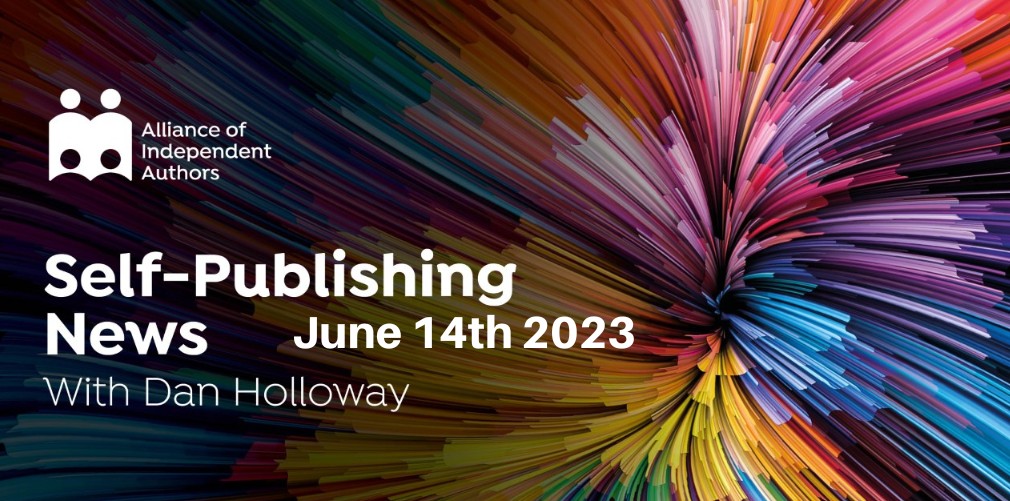In this week's Self-Publishing News Special, ALLi News Editor Dan Holloway takes a look at a new dedicated virtual reality ereader.

ALLi's News Editor Dan Holloway
Do tune in and listen to the latest Self-publishing News podcast. Howard and I have been talking about the German study of young people's reading habits. We had a particularly interesting time thinking about what the increasing clamp down on TikTok in the US meant for social media's reading culture and fiction-centred aesthetic groups (of special note because of the platform's prevalence in driving reading in Germany).
Sol's Virtual Reality eReader Ships Beta Version
It’s great for once to have a tech story to bring you that’s about hardware, not NFTs or AI. That said, I can hear the sound of many of your eyeballs rolling already. Virtual reality is a technology that gets everyone very excited for short periods before it turns out to be less interesting than we all thought. Again. I remember this cycle going on back in my student days in the 1990s when the film of Stephen King’s The Lawnmower Man came out. And it’s been going on ever since. Right up to people realising that Mark Zuckerberg’s vision for the Metaverse might just be the biggest white elephant yet.
This week I have news of a new virtual reality device that will act as a dedicated ebook reader. Sol will ship early test products this week. The VR reader seems to be, essentially, a pair of glasses with e-ink lenses that lock you into your ebook’s world without distraction. The reader includes lens adjustment so you can use it without your actual glasses or contact lenses. The manufacturers believe it will increase focus and help people who prefer reading on a screen to immerse themselves in what they’re reading while they do so.
Part of a move back to specialist devices?
It’s easy to dismiss things like this as a gimmick. And after decades of simplification and consolidation around the premise, “why carry separate devices when you could access everything from the same place” (which reminds me of the old shampoo and conditioner adverts of my childhood), it feels a little odd that these things would separate out again. But the move to dedicated devices is growing. So-called “dumb phones” are on the rise. As are dedicated devices you just type on! The ereader itself, of course, is one such device. And the poster child for the single purpose e-device is the Remarkable tablet. These devices base their success on two elements. First is that they offer freedom from the distractions of the smartphone, a value people increasingly perceive. Second, they spring from the recognition that with some of our most personal activities, especially ones we like to immerse ourselves in and devote ourselves to, like reading and writing, it might be better to have separate tools that perform at a superlative level rather than one multi-tool that does everything “well enough”
Amazon: Ad-supported Prime and the Return of Price Fixing Legal Battles
While we’re talking about things that are hot topics for a while before fading, let’s turn to Amazon Prime’s latest. Rumour has it Amazon Prime Video may become the latest high-profile subscription service to add an ad-supported tier to its offering. This would sit alongside its current FAST free, ad-supported TV offering, which provides free channels with adverts to Fire TV users.
Netflix has already added such a tier to its pricing structure. The platform seems to be claiming that its 5 million customers for the ad-supported tier is a success. Momentum for the model continues to gather.
In less positive news for Amazon, the legal case accusing them and the Big Five publishers of ebook price fixing is back. Courts will hear oral arguments on June 22nd. The case alleges that the companies involved have coordinated efforts to keep ebook prices artificially high at the expense of consumers. The case first came forward a couple of years ago, when it was dismissed. A beefed up version will cite the anti-trust ruling against the PRH-Simon and Schuster merger.
Governments Draw Their Lines on AI
The week isn’t completely without news from the world of AI, but I will keep the stories here under a single item. This works well as most of the news this week centres on government initiatives from around the world. Here in the UK, the government has announced plans to host a global AI Safety summit. There is as yet no date or list of attendees, but Techcrunch’s write up of the story delivers a burn I can feel from here.
In the US and Japan, the news focuses on copyright. There is a really handy article here that summarises the recent arguments before the House Judiciary committee on AI and copyright. They seem all to be ways of saying, “we need to do something, but it’s hard.” And they leave it to courts to do the actual heavy lifting.
In Japan, meanwhile, the government has issued a much clearer statement. And one that comes down firmly on the side of creators in a way neither of the two aforementioned countries has. The statement allows for educational uses of AI, but not commercial ones that infringe copyright. And where a use does infringe copyright, there will be damages for creatives, and possible criminal penalties. Interesting stuff!
Do we need a virtual reality ereader? (because one's on the way), and other top #selfpub news stories for #indieauthors, in one quick read, by #ALLi News Editor Dan Holloway @agnieszkasshoes #digitaleconomy #publishingopenup Share on X



